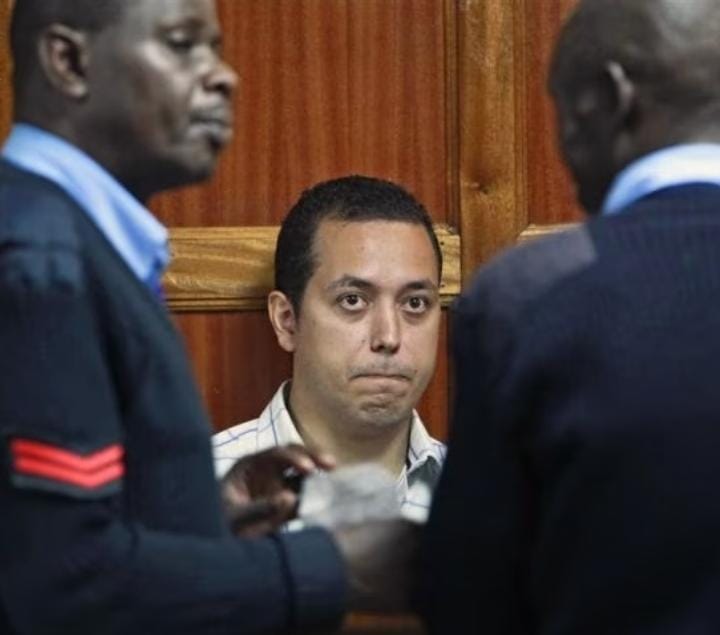NAIROBI Kenya July 14 -Dwight Saragay, who was on Friday July 14 jailed for 20 years for murdering the former Venezuelan Ambassador became the first senior diplomat to be charged with a serious criminal offence in Kenya.
Almost everything about Saragay’s career and downfall were swift.
Though the wheels of justice initially turned unusually slowly, everything else happened so fast and finally, Justice Roseline Korir has sentenced Saragay and his three co-accused persons.
Saragay, Ahmed Omindo, Alex Wanyonyi and Moses Kalya have been sentenced to a cumulative 80 years in prison.
Each of the accused will serve 20 years behind bars.
In her judgement, Trial Judge Roselyn Korir said the state had proved their case against the accused persons apart from Chelogoi who was acquitted.
The prosecution presented an array of witnesses, 37 in total and produced 39 exhibits that were used to pin down the four.
The judge said the offence committed was serious and called for a custodial sentence.
“I have considered the trial has taken an unduly long period and the accused persons must have undergone mental anguish during the pendency of trial,” Korir said.
During mitigation, Dwight 45, said if runaway suspect Mohamed would be arrested, he would be vindicated. He pleaded for mercy and leniency.
He is single and has no children but he maintained good relations with his family. Though since the trial began, Dwight said the separation from his family took a turn on him.
He lamented over how his government treated him and how he was still tried yet his diplomatic status was still intact.
Fonsescas’s family however asked the court to sentence the convicts as per the Kenyan law. They also asked the Kenyan government to consider compensating their family as they regret losing her life.
The Vienna Convention
According to the Vienna Convention on Diplomatic Relations (1961), it was agreed as international law that all diplomats were considered not susceptible to lawsuit or prosecution under the host country’s laws.
If they are to be charged, the immunity must first be waived, following a procedure, since they enjoy immunity from criminal proceedings.
However, Saragay -who rose very fast in the Venezuelan Foreign Service -was stripped of his immunity by his country the following day, and placed in a police cell at the Gigiri police station.
Within 24 hours, Saragay had been stripped of his immunity and placed in police custody, and interestingly enough, the Foreign Service of Venezuela never objected, at all.
Again, President Hugo Chavez, Foreign Minister Nicolas Maduro, and Attorney General Luisa Ortega Diaz kept silence about the whole issue.
According to his colleagues, he was a lucky man who rose faster, but fell harder in his career where he appeared to have been at the right place at the right time.
Saragay had previously worked as a lawyer for the Labour Ministry where his tasks included representing Venezuela at international meetings to discuss labour issues.
He was hired at the Venezuelan Foreign ministry in July 2010 and within a few days he was sent to Kenya where he served briefly before being promoted to the second position at the Embassy in Nairobi.
When the former Ambassador Gerardo Carrillo Silva fled Kenya in March 2011 after he was accused of sexual harassment by three male Kenyan employees, Saragay became the top representative in Kenya.
He took control of the embassy, including the accounts.
Mid July 2012, officials in Caracas, the capital of Venezuela deployed Fonseca to Nairobi to take over as the Charge d’affaires.
On July 27 2012, the veteran diplomat Fonseca was found murdered in her official Runda residence.
The brutal murder happened just 12 days after she took over as the head of the Embassy of Venezuela in Nairobi.
Saragay was a close associate of Mohamed Ahmed Hassan who the court found to have been the principal planner and executor of the murder, but is still at large.
The two had established themselves at the Embassy, and were against Fonseca’s arrival in the country and the control of the Embassy.
Hassan had unlimited access and control of the embassy, vehicles, bank accounts and staff. He used to pay the staff and instructed staff on their duties.
Interestingly, the embassy had not requested for police security from the unit notwithstanding the fact that the senior officials there were aware of the security situation in the country.
However, immediately after the incident officers were assigned both at the residence, 317 Runda Grove, and the embassy.
The then acting Venezuelean ambassador who came from the country’s embassy in Ethiopia is said to have written to the police boss requesting for enhanced security.
In 2015, another United Nations (UN) staff was also arrested for assaulting his former wife whom he separated with in 2012.
The UN also, through a note verbale, informed both the police and the court that his immunity did not extend to suspected criminal activity.
The UN in a statement also emphasised the need to respect local laws and stated that the employees enjoyed immunity from legal process only in respect of words spoken or written, and of acts performed by them in their official capacity.
The Vienna Convention is not meant to benefit individuals but to ensure the efficient performance of the functions of diplomatic missions.
It is also aimed at contributing to the development of friendly relations among nations, irrespective of their differing constitutional and social systems.
Want to send us a story? Contact Shahidi News Tel: +254115512797 (Mobile & WhatsApp)


